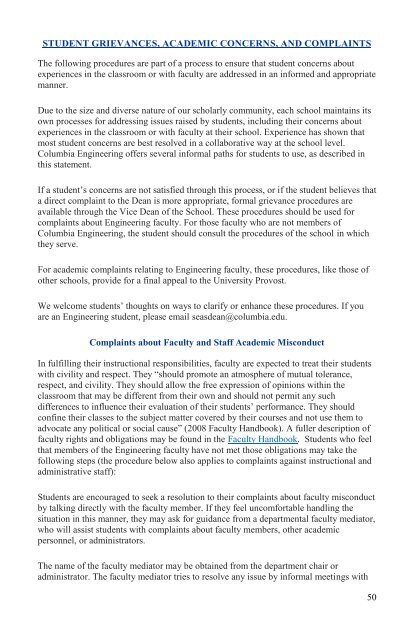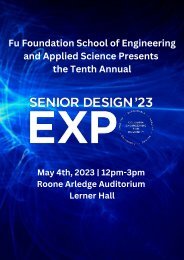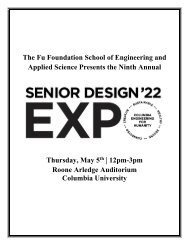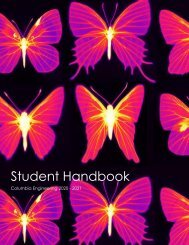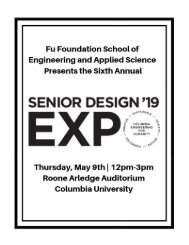SEAS Student Handbook
You also want an ePaper? Increase the reach of your titles
YUMPU automatically turns print PDFs into web optimized ePapers that Google loves.
STUDENT GRIEVANCES, ACADEMIC CONCERNS, AND COMPLAINTS<br />
The following procedures are part of a process to ensure that student concerns about<br />
experiences in the classroom or with faculty are addressed in an informed and appropriate<br />
manner.<br />
Due to the size and diverse nature of our scholarly community, each school maintains its<br />
own processes for addressing issues raised by students, including their concerns about<br />
experiences in the classroom or with faculty at their school. Experience has shown that<br />
most student concerns are best resolved in a collaborative way at the school level.<br />
Columbia Engineering offers several informal paths for students to use, as described in<br />
this statement.<br />
If a student’s concerns are not satisfied through this process, or if the student believes that<br />
a direct complaint to the Dean is more appropriate, formal grievance procedures are<br />
available through the Vice Dean of the School. These procedures should be used for<br />
complaints about Engineering faculty. For those faculty who are not members of<br />
Columbia Engineering, the student should consult the procedures of the school in which<br />
they serve.<br />
For academic complaints relating to Engineering faculty, these procedures, like those of<br />
other schools, provide for a final appeal to the University Provost.<br />
We welcome students’ thoughts on ways to clarify or enhance these procedures. If you<br />
are an Engineering student, please email seasdean@columbia.edu.<br />
Complaints about Faculty and Staff Academic Misconduct<br />
In fulfilling their instructional responsibilities, faculty are expected to treat their students<br />
with civility and respect. They “should promote an atmosphere of mutual tolerance,<br />
respect, and civility. They should allow the free expression of opinions within the<br />
classroom that may be different from their own and should not permit any such<br />
differences to influence their evaluation of their students’ performance. They should<br />
confine their classes to the subject matter covered by their courses and not use them to<br />
advocate any political or social cause” (2008 Faculty <strong>Handbook</strong>). A fuller description of<br />
faculty rights and obligations may be found in the Faculty <strong>Handbook</strong>. <strong>Student</strong>s who feel<br />
that members of the Engineering faculty have not met those obligations may take the<br />
following steps (the procedure below also applies to complaints against instructional and<br />
administrative staff):<br />
<strong>Student</strong>s are encouraged to seek a resolution to their complaints about faculty misconduct<br />
by talking directly with the faculty member. If they feel uncomfortable handling the<br />
situation in this manner, they may ask for guidance from a departmental faculty mediator,<br />
who will assist students with complaints about faculty members, other academic<br />
personnel, or administrators.<br />
The name of the faculty mediator may be obtained from the department chair or<br />
administrator. The faculty mediator tries to resolve any issue by informal meetings with<br />
50


